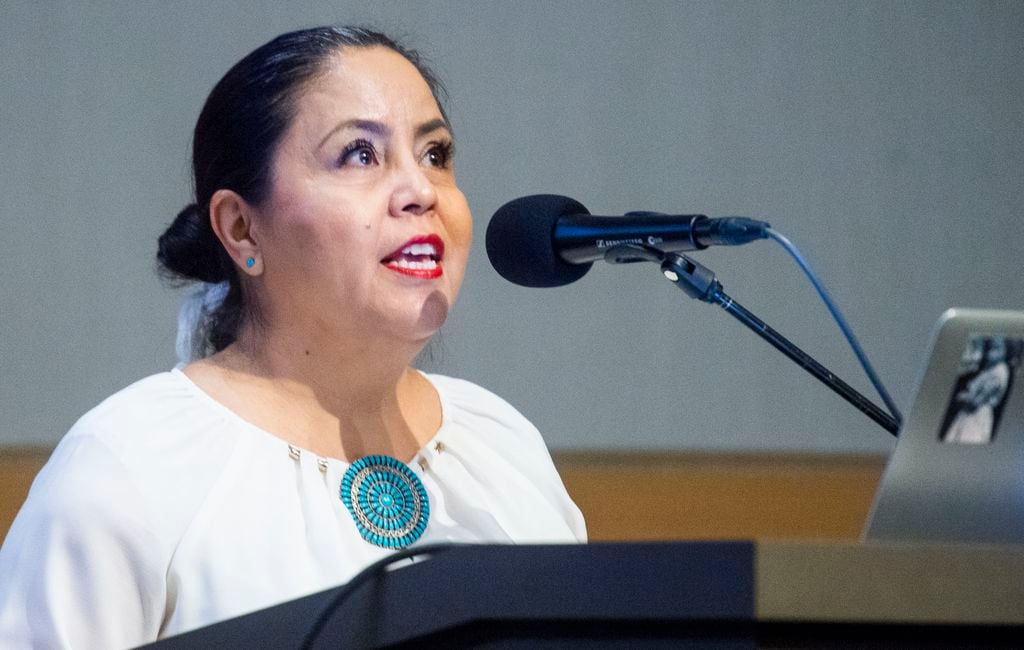Utah had boarding schools in Aneth, Intermountain, Ouray, Uintah and Panguitch.
 |
| (Rick Egan | The Salt Lake Tribune) Yolanda Francisco-Nez, Executive Director, Restoring Ancestral Winds, speaks about "Missing and Murdered Indigenous People in Utah" during a workshop at the Salt Lake City Library Auditorium, Monday, July 22, 2019. |
Since the discovery of Indigenous children at boarding schools in Canada and then the unverified findings of Paiute bodies at the Panguitch Boarding School, the nonprofit Restoring Ancestral Winds (RAW) began research on the association between Indigenous boarding schools and domestic violence across Utah’s Indigenous communities.
On a panel called “Utah Native American Boarding Schools and other Assimilation Projects on Native Children and Families” hosted by RAW, Indigenous organizers said the Indian Civilization Act of 1819 is a precursor to some of the domestic violence among Native Americans in Utah.
The Indian Civilization Act, or Civilization Fund Act of 1819, is a federal policy that encouraged the assimilation of Indigenous children via boarding schools. From that policy came the formation of Utah boarding schools in Aneth, Intermountain, Ouray, Uintah and Panguitch.
“We have known that there’s a connection between missing and murdered Indigenous women, girls and two-spirit with domestic violence,” said Yolanda Francisco, executive director for RAW. Two-spirit people identify as being both feminine and masculine in spirit. “We have to mention that domestic violence plays a role; it’s a precursor to going missing or murdered.”
While the correlation between domestic violence and Indigenous boarding school has not been well studied, Francisco says she knows that the discipline experienced among Indigenous children influences how they eventually parent.
“There is definitely a role that punishment plays in the life of an individual who survives the boarding school experience, particularly those who were victims of that abuse that occurred,” she said.
Children were subjected to harsh punishments in the schools, ranging from the forced cutting of their hair, which is considered an important part of tribal identity, to eating soap for speaking their language, and other physical, emotional and sexual abuse. The living conditions were also poor and kids died from tuberculosis, whooping cough, measles, the flu and smallpox.
Thursday’s panel featured speakers Davina Smith, who is Navajo (Diné), Denae Shanidiin, who is Diné and Korean, and Kalama Ku’ikahi, who is Diné and Native Hawaiian, who all shared their experiences of boarding schools — either as survivors or through the experience of their parents and grandparents.
“When I think about boarding and foster care children, they’re also considered underneath this umbrella of missing and murdered Indigenous peoples,” Shanidiin said. She hoped the panel would bring more awareness of the Paiute children who attended the Panguitch Boarding School and other Indigenous children at other schools.
Ku’ikahi made connections between the Indian Civilization Act and the early boarding schools in Utah, noting that Christian churches and missionaries influenced the policy.
For example, the Uintah Boarding School, or Ute Indian Boarding School, was established in 1881 by the Episcopal Mission, as was the Ouray Boarding School in 1885. The Panguitch school was Presbyterian.
The Church of Jesus Christ of Latter-day Saints’ Indian Student Placement Program, which operated from 1947 to 2000, took approximately 50,000 Native children from reservations and placed them in Latter-day Saint homes, he said.
Smith said the connections between domestic violence and boarding schools run deep in her family.
Recently, Smith ran over 360 miles from Bears Ears National Monument and Grand Staircase Escalante National Monument to bring awareness to Indigenous issues like boarding schools and missing and murdered Indigenous people.
“I know for me I had to end that generational trauma for my kids because I did not want them to go through that,” Smith said. “And it was also about me talking and opening up my traumas with my kids. Just recently, I was able to open up to my mother and talk about it.”























No comments:
Post a Comment
Please: Share your reaction, your thoughts, and your opinions. Be passionate, be unapologetic. Offensive remarks will not be published. We are getting more and more spam. Comments will be monitored.
Use the comment form at the bottom of this website which is private and sent direct to Trace.